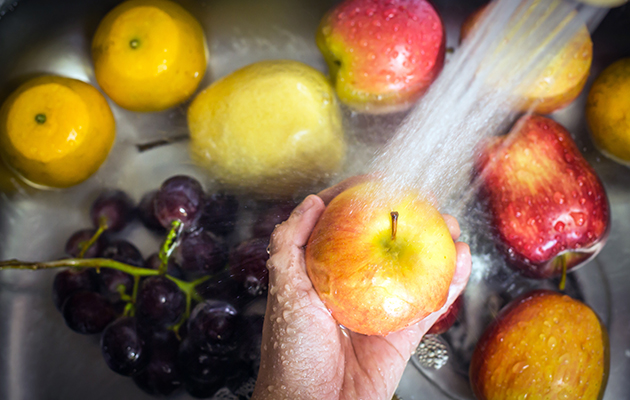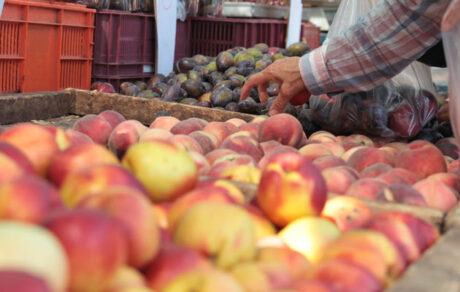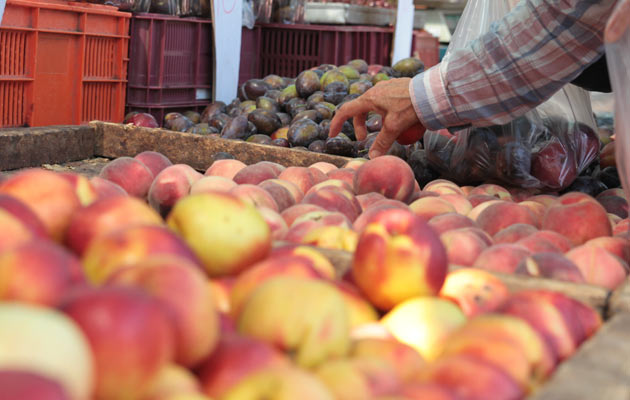Does an apple a day really keep the doctors away? We consume more than 92 kg of vegetables and 70 kg of fruit on average per year. Thus, it is assumed that we already know everything about handling fruits and vegetables properly. However, we often forget how dirty they are. In actual fact: apples, potatoes and others are real germ traps! Cleaning expert at Helpling, Roxanna Pelka, explains how to do a proper fruit and vegetable hygiene check and also listed down why even avocados and mangoes also need extensive washing:
The Walking Germs: Getting onto the track of bacteria
Your fruit have travelled thousands of kilometers and before ending up in the supermarket and in your fruit bowl. To extend its shelf-life, they are often sprayed with a toxic cocktail of pesticides and coated with wax, which can cause stomach cramps, fever or headache and can even lead to food poisoning, asthma or diabetes.
Another germ trap is our local supermarket right around the corner: During your next grocery shopping trip, take your time at the fruits department and observe the customers while they pick their fruits. Not rarely will you find people picking up a fruit and smelling them at close proximity or checking the ripeness of the fruit with their dirty hands. It is believed that our own hands contain up to 4700 different types of bacteria!
However, our hands aren’t the only magnet for germs and dirt: Flies love to lay their eggs in fruit and vegetable boxes! No matter how fresh the fruits and vegetables seem, always take note on how dirty they actually are!
Peaches, peppers, potatoes: Do they make you sick or healthy?
No matter how plump and juicy the strawberries look, we should resist the temptation of finishing them up before arriving back at home. During farming, due to the constant threat of pests, insects and unsettled weather conditions, fruits and vegetables are often sprayed with pesticides around 15 to 20 times per week with at least 30 different types of pesticides. In addition, some produce are also coated with shelf-life extending wax.
According to the Federal Office of Consumer Protection, produce such as peaches, peppers and potatoes showed higher concentrations of pesticides than other produce, making it to the Dirty Dozen list- an overview of the most dangerous contaminants and pesticide residues that can be found on fruits and vegetables.
The Rescue: How to clean your fruit properly

YES, it really is as simple as it sounds: wash your fruits and vegetables with cold water. After only 15 seconds of washing, the cold water can reduce up to 98 % of the bacteria. Keep it simple: Don’t wash the fruit for too long, otherwise you will damage the natural protective layer around the products and lose important vitamins. Make sure that you wash your fruits and veggies right before consuming them. This is because bacteria loves to multiply in damp surrounding.
Still have doubts on how to wash specific fruits or vegetables? We listed the most common produce and the techniques to clean them:
Apples and pears:
Small, but loaded with vitamins: Apples and pears are undoubtedly a favourite among Singaporeans! Did you know, that most vitamins of these fruits are embedded in the skin? Instead of peeling the fruit, wash it thoroughly, making sure that you are taking in the recommended daily dose of vitamins – and stay really healthy!
Berries and grapes:
Soft fruits such as these produce should be washed carefully by soaking them in water instead of washing them under running water. Let the fruit dry on a paper towel after.
Melon, mango, avocado:
Even if you don’t eat the skin of some fruits and vegetables, the germs and pesticides can reach the fruit pulp while peeling and cutting them through the blade or our hands. Rinse the skin with warm water before preparing your next fruit salad. Another trick to disinfect them: In a spray bottle, mix one tablespoon of white vinegar and one of lemon juice with one cup of water. Spray the mixture on the skin of melon or similar fruits and let them soak for about 10 minutes. Rinse the fruits under water and they are ready to be peeled off.
Potatoes, carrots, squash:
Brush away the dirt on vegetables with a vegetable brush. After doing so, wash the products, peel them and then wash again – it is always best to be extra careful with fruits and vegetables on the Dirty Dozen list!
Salad:
Should you wash salads that are labelled “washed and ready to eat”? Yes! pre-washed salads are often full of yeasts and mildew, which can cause gastrointestinal discomfort. Let the lettuce soak in cold water, so that minerals won’t be washed away. Then dry the leaves in a salad spinner. Extra tip: Acidic salad dressings can have disinfectant effects! In addition to prior washing, the oil and vinegar salad dressing mixture will reduce the bacterial count on your salad to less than 1 percent!





